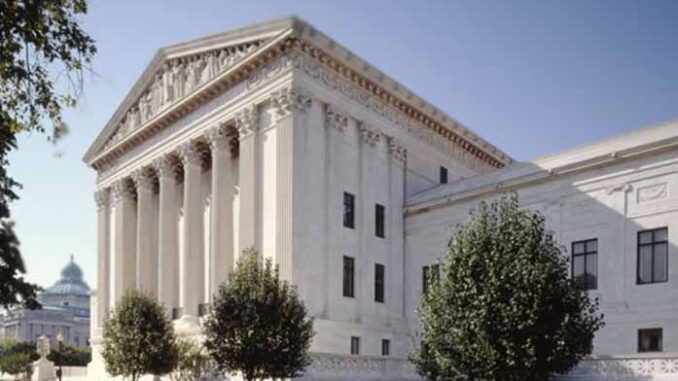
WASHINGTON – The San Carlos Apache said Monday that the federal government owes it $3 million for health care services, one of two tribes arguing before the Supreme Court for more support from the Indian Health Service.
But attorneys for the government argued that allowing tribes to claim additional overhead costs for the health care they provide their members would strap the system, and end up siphoning away money for care of Native Americans in other tribes.
Caroline Flynn, an assistant to the U.S. solicitor general, told the justices that the tribes’ argument “would work a sea change” in the law that sets out how tribes are compensated for costs they incur in providing care to their members.
Flynn said that if the court were to side with the tribes, it would “upend how the statute has been administered for 35 years.” What the tribes are asking for is “potentially tripling the federal government’s contract support cost obligation and eventually transforming what the statute designates as mere support costs into the primary component of contract funding,” Flynn said.
That was disputed by Adam Unikowsky, who argued on behalf of the Northern Arapaho Tribe of Wyoming, which he said is seeking reimbursement of $1.5 million from 2016 and 2017. He said the Indian Self-Determination and Education Act (ISDA) “entitles the tribes to recover the disputed contract support costs in this case” from the Indian Health Service.
RELATED STORY: New and upgraded health care facilities for Native Americans open in Arizona
“In the ISDA contract, IHS transferred to the tribe the responsibility both to collect and to spend the program income on health care,” Unikowsky said. “So when the tribe carries out health care services using program income, it does so as a means of fulfilling its contractual obligation to further the general purposes of the contract. So, it’s acting pursuant to the contract.”
At issue is the interpretation of the contract that IHS enters into with tribes that agree to take on the job of providing health care to their members in lieu of the federal government. Under that deal, the government gives tribes the money it would normally spend on health care, along with additional funding to compensate tribes for the overhead costs of administering such care.
Flynn said that IHS currently spends about $1 billion a year on contract support costs out of a total program budget of about $8 billion.
“It stands to reason that if all of a sudden contract support costs just explode, Congress is going to have to find the cuts elsewhere to keep the budget under the discretionary spending caps,” she said.
Several justices picked up that thread during arguments, with Justice Brett Kavanaugh asking if such an increase in costs to the IHS would end up hurting the overall program.
“Because Congress couldn’t cut, without changing its rules, mandatory spending, correct, so it would have to come out of the other discretionary funding?” Kavanaugh asked.
But Justice Ketanji Brown Jackson asked whether the government couldn’t simply renegotiate its contracts with the tribes in such a situation.
RELATED STORY: Hopi leader tells panel that red tape, financial hurdles put aid our of reach
“If the costs balloon, which seems to be a lot of your concern, you explored with Justice Kavanaugh where the cuts might have to come from,” Jackson said. “But I’m wondering if there’s something that precludes renegotiation of the contracts in light of potential cost escalations of the nature that you’re talking about.”
The government said the added costs could ultimately range from $800 million to $2 billion – a number the tribes said was “taken out of nowhere” and of which Justice Neil Gorsuch appeared skeptical.
Gorsuch also questioned the government claim that a ruling in favor of the tribes would open the door to the potential for non-Indian individuals to have their health care funded by IHS – something attorneys for both the San Carlos Apache and Northern Arapaho flatly denied.
“You raised the specter that they’re going to expand their programs to help non-Indians,” Gorsuch said. “Maybe they’re free to do that – you’re right – statutorily. But, in terms of the contract support services that would be required to be paid from the government, it would seem to be limited.”
Gorsuch also pointed out the larger stakes at issue in the tribal health care coverage that he said has long been underfunded.
“There’s not even enough money to provide health care to the Indians on the reservations, and you’re operating out of decrepit old buildings in many cases. That’s what we’re really talking about,” he said.

If you want to be an independent, separate, nation, then be an independent, separate, nation.
Freeloaders who refuse to join society.